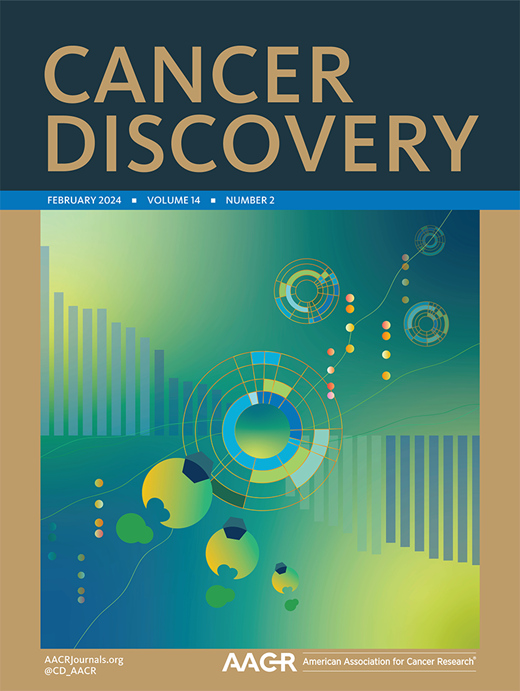Botensilimab是一种Fc增强型抗CTLA-4抗体,对传统免疫疗法反应不佳的肿瘤有效。
IF 29.7
1区 医学
Q1 ONCOLOGY
引用次数: 0
摘要
以CTLA-4为靶点的传统免疫检查点抑制剂(ICI)可获得持久生存,但主要针对免疫炎症肿瘤患者。尽管人们对抗 CTLA-4 反应的机制仍不甚了解,但 FcγR IIIA 共同参与似乎对活性至关重要,这可能是已获批准的抗 CTLA-4 抗体临床疗效一般的原因。我们证明,为增强 FcγR 亲和力而设计的抗 CTLA-4 可利用 FcγR 依赖性机制来增强 T 细胞的反应性、减少瘤内 Tregs 并增强抗原提呈细胞的活化。与传统的抗CTLA-4相比,Fc增强型抗CTLA-4能促进小鼠模型的卓越疗效,并重塑先天和适应性免疫。这些研究结果扩展到了使用博腾西利单抗(一种Fc增强型抗CTLA-4抗体)治疗的患者身上,博腾西利单抗对多种免疫原性较差的癌症和ICI治疗难治性癌症具有临床活性。疗效与肿瘤新抗原负荷或FcγRIIIA基因型无关。然而,FcγRIIA和FcγRIIIA的表达成为潜在的反应生物标志物。这些数据凸显了Fc增强型抗CTLA-4抗体在对传统ICI疗法无反应的癌症中的治疗潜力。本文章由计算机程序翻译,如有差异,请以英文原文为准。
Botensilimab, an Fc-Enhanced Anti-CTLA-4 Antibody, Is Effective against Tumors Poorly Responsive to Conventional Immunotherapy.
Significance: This study reveals that Fc-enhanced anti-CTLA-4 harnesses novel mechanisms to overcome the limitations of conventional anti-CTLA-4, effectively treating poorly immunogenic and treatment-refractory cancers. Our findings support the development of a new class of immuno-oncology agents, capable of extending clinical benefit to patients with cancers resistant to current immunotherapies.
求助全文
通过发布文献求助,成功后即可免费获取论文全文。
去求助
来源期刊

Cancer discovery
ONCOLOGY-
CiteScore
22.90
自引率
1.40%
发文量
838
审稿时长
6-12 weeks
期刊介绍:
Cancer Discovery publishes high-impact, peer-reviewed articles detailing significant advances in both research and clinical trials. Serving as a premier cancer information resource, the journal also features Review Articles, Perspectives, Commentaries, News stories, and Research Watch summaries to keep readers abreast of the latest findings in the field. Covering a wide range of topics, from laboratory research to clinical trials and epidemiologic studies, Cancer Discovery spans the entire spectrum of cancer research and medicine.
 求助内容:
求助内容: 应助结果提醒方式:
应助结果提醒方式:


